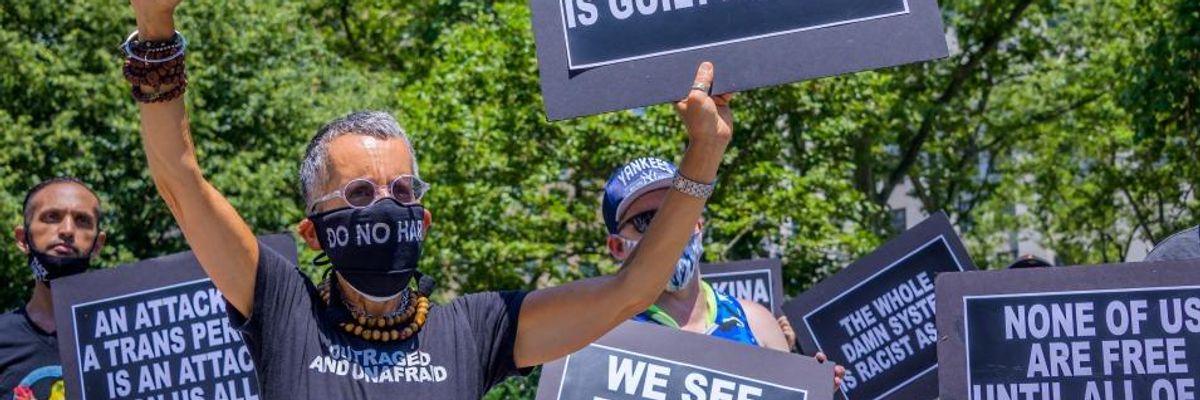More than 300 legal scholars from law schools across the U.S. on Thursday signed a letter imploring congressional leaders to pass legislation to fully abolish qualified immunity for police officers and hold local governments accountable when a person's constitutional rights are violated.
A provision of the Civil Rights Act of 1871, known as Section 1983, was meant to allow people to seek redress when their rights have been violated by the state.
The letter argues that the U.S. Supreme Court has "drained the life" from Section 1983 by elevating the concept of qualified immunity, which places an "overwhelming burden" on plaintiffs who seek to prove that they're entitled to damages following police misconduct.
"All available evidence suggests that qualified immunity does not achieve its intended goals of shielding government officials from liability for good-faith mistakes."
--Joanna Schwartz, UCLA School of Law
The court requires victims to make their case by presenting at least one previously decided case in which a constitutional rights violation was proven, wrote the law professors, who teach at dozens of law schools including UCLA, NYU School of Law, Berkeley School of Law, and the University of Chicago Law School.
"Most courts require a plaintiff to produce a case in which the Supreme Court or Court of Appeals has held unconstitutional conduct involving virtually identical facts. The requirement places an overwhelming burden on plaintiffs," they wrote.
With many plaintiffs unable to produce the prove demanded by the justice system in order to hold accused officers liable, courts frequently give police departments "one free pass," and decline to rule on the merit of the plaintiff's claims.
Plaintiffs are also required to prove that officer misconduct was "caused by an official policy or custom" at the police department in question, thanks to the 1978 Supreme Court case Monell vs. Department of Social Services.
"In most cases, a plaintiff would have to demonstrate a pattern of very similar constitutional violations and show that policymakers had knowledge of such incidents and failed to address the problem," wrote the professors.
As it stands, Section 1983 often "results in no redress for persons whose constitutional rights have been violated," they added.
The letter comes days after the U.S. House passed the George Floyd Justice in Policing Act, and a day after Sens. Ed Markey (D-Mass.), Elizabeth Warren (D-Mass.), and Bernie Sanders (I-Vt.) introduced a bill to end qualified immunity. The law professors stated their endorsement of the legislation.
"Congress could pass a bill tomorrow that would end qualified immunity, and I am pleased to see congressional attention to this issue," UCLA Professor Joanna Schwartz, who helped spearhead the letter, told Common Dreams. "But at this point, Republican leadership has described qualified immunity reform as a 'poison pill' for police reform legislation. I hope they reconsider--particularly given that all available evidence suggests that qualified immunity does not achieve its intended goals of shielding government officials from liability for good-faith mistakes."
As the letter notes, a common defense of qualified immunity--that it shields police officers from being held liable and potentially facing astronomical legal fees after making a reasonable mistake on the job--is not made in good faith.
"The Supreme Court's Fourth Amendment doctrine already recognizes that officers often must take decisive action under quickly changing circumstances, and already protects officers from liability when they make reasonable mistakes," the letter reads. "Moreover, even if an officer is found liable, he is almost certain not to face bankruptcy."
In nearly all cases, officers are protected by indemnification agreements with their departments and local government agencies pay settlements when they are accused of wrongdoing. Schwartz expressed hope that the recent legislation or similar bills will pass in the coming weeks, but noted that in terms of far-reaching police reforms that advocates have demanded in recent weeks, "we still have very far to go."
"Protests and the advocacy work of Black Lives Matter, Campaign Zero, and other groups have made clear that police violence--particularly police violence against Black men--is an epidemic," Schwartz said. "Ending qualified immunity and allowing municipal liability would not cure the embedded problems with policing, but would be an important step forward... All we can do is hope that meaningful change can be passed by Congress in the coming weeks."
Read the full letter below:

